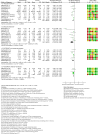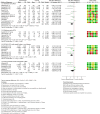Efficacy of halofuginone products to prevent or treat cryptosporidiosis in bovine calves: a systematic review and meta-analyses
- PMID: 33261668
- PMCID: PMC11010047
- DOI: 10.1017/S0031182020002267
Efficacy of halofuginone products to prevent or treat cryptosporidiosis in bovine calves: a systematic review and meta-analyses
Abstract
A prior systematic review on the efficacy of halofuginone (HFG) treatment to prevent or treat cryptosporidiosis in bovine calves was inconclusive. We undertook an updated synthesis and meta-analyses on key outcomes for the treatment of calves with HFG. Evaluated outcomes were oocyst shedding, diarrhoea, mortality and weight gain. Experiments had to describe results for same age animals in contemporary arms. Most doses were 100-150 mcg kg-1 day-1. Results were subgrouped by study design, experiments with the lowest risk of bias and lack of industry funding. Eighteen articles were found that described 25 experiments. Most evidence came from randomized controlled trials in Europe. Significantly lower incidence of oocyst shedding, diarrhoea burden and mortality was reported when treatment started before calves were 5 days old. Most studies reported on outcomes for animals up to at least 28 days old. Publication bias was possible in all outcomes and seemed especially likely for diarrhoea outcomes. Beneficial results when HFG treatment was initiated in calves older than 5 days were also found. Prophylactic treatment to prevent cryptosporidiosis is effective in preventing multiple negative outcomes and is beneficial to calf health and will result in a reduction of environmental contamination by Cryptosporidium oocysts.
Keywords: Bovine calves; cryptosporidiosis; dairy; diarrhoea; halofuginone.
Conflict of interest statement
None.
Figures









References
-
- Åberg M, Emanuelson U, Troell K and Björkman C (2020) A single-cohort study of Cryptosporidium bovis and Cryptosporidium ryanae in dairy cattle from birth to calving. Veterinary Parasitology: Regional Studies and Reports 20, 100400. - PubMed
-
- Al Mawly J, Prattley D, French N, Lopez-Villalobos N, Hedgespeth B and Grinberg A (2013) Utility of halofuginone lactate for the prevention of natural cryptosporidiosis of calves, in the presence of co-infection with rotavirus and Salmonella typhimurium. Veterinary Parasitology 197, 59–67. - PMC - PubMed
-
- Brainard J, Hammer CC, Tyler K and Hunter PR (2020a) Efficacy of non-halofuginone based strategies to prevent or treat cryptosporidiosis: a systematic review. preprints.org. - PMC - PubMed

